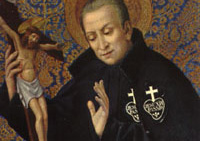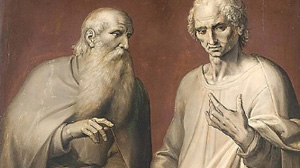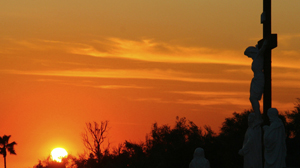Reflection:
Most of us prefer to rely on our human resourcefulness in order to achieve a task. We often undergo training or education precisely for this purpose so that we become capable people who can meet life’s challenges and accomplish them.
Our bible readings today attempt to bolster this self-confidence. They accomplish this from the angle of both faith and human nature. They forcefully remind us that we are competent people, fortified and strengthened in a very human project by the special gifts God places at our disposal.
For example, the Pauline letter to the Ephesians reminds us of such a resource in terms of our faith. It features another instance of Paul’s incapacity brought on him by an imprisonment. It’s instructive to note Paul is not concerned about his own welfare, or by his future. His whole concern centers around the Christian community in Ephesus to whom he writes. And he exhibits unbounded confidence in the faith that he has imparted to the Ephesian community. He does this despite his inability to be physically present to them. This is an encouraging sign for all of us who share in that same faith, helping us to realize the power and strength latent in it. At times faith seems comparable to something like “easy come, easy go”, since some of us may never have experienced the challenge of having our faith challenged when we undergo a difficult situation, and wonder or even fear that it may not measure up to the vigor and potential that Paul reflects today in his remarks to the Ephesians. He is totally incapacitated to provide for them in their difficulties—apart from this letter that he writes them, and the faith that he shares with them. But we, along with them, are the beneficiaries of the wisdom he exhibits in this letter.
And St. Luke supports St. Paul in his contribution to the scriptural messages to us today. But in a different way. Unlike St. Paul who falls back upon the faith that he shares with the Ephesian community, St. Luke depends on something else held in common with the readers of his gospel: our humanness. For he appeals to an inveterate habit most of us exhibit, often several times each day: the state of the weather. When we rise in the morning we are anxious to know the weather forecast for the day, and when, in the evening, before retiring we look at the evening news, including the weather forecast for the next day, we exhibit that fascinating habit we have that early on St. Luke noted: a weather concern. For he observes how today we observe the cloud arising in the west, and the likelihood that rain is in the forecast, and he also comments on our ability at forecasting the coming of some hot weather, based on the observation about the hot wind that has gotten underway. Luke here astutely remarks on a familiar procedure most of us observe, regardless of our religious beliefs or our nationality or our gender or our age: the very human proclivity to know the weather conditions. It may be that all we share with one another is our humanity, but it’s enough to bind us together in this one activity: keeping appraised of the weather. But, of course, Luke is not trying to excel at being a reliable weatherman. Rather, he is taking us to task for not duplicating this very human pastime in the faith area, so that we try to forecast what God will be about in our lives, helping us to “interpret the present time.”
And Luke follows the same procedure, as he notes how all deal with a potential judgment to which we are liable as he outlines the process for responding to a traffic accident, that may involve the police, an injured party; a judge and maybe a jailer, comparing how this same scenario can play itself out when our failures come to God’s attention. Luke notes how a very human situation like this can be repeated in the next life.
So both faith and the human condition (nature and supernature), as we have traditionally articulated it) offer a stage on which both St. Paul and St. Luke instruct us on what is occurring in our lives, as we try relating to God. We live on both levels, and deal with God in each scenario. Together they constitute a large area of opportunity for enriching and improving our interaction with God.
Fr. Sebastian MacDonald, C.P. is a member of the Passionist formation community at Catholic Theological Union, Chicago.








